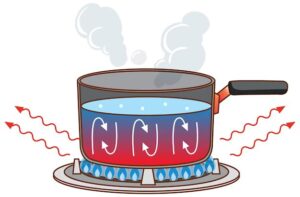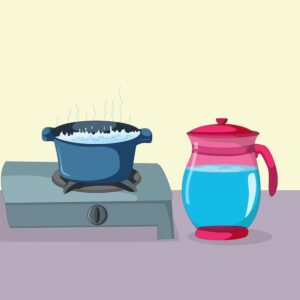How long does it take to boil water in a microwave and on a hob is a fascinating and fairly scientific topic that we will be talking about today.
This detailed guide will go through every factor that could impact the total boiling time, how to shorten it, and other things to think about for each method.
Having this knowledge can help you keep your water safe to drink, organise your meal preparation workflow effectively, and avoid over- or underboiling your items, which could cause uneven cooking.
Why Is It Vital to Understand?
Okay, I see now! What a bizarre question to pose. However, there are MANY reasons why it’s vital, and that’s the point.
One benefit of boiling is that it creates water that is suitable for drinking and cooking. You still risk becoming very ill from drinking it if you don’t boil it for long enough or hot enough to destroy the dangerous bacteria. See how it is essential to understand how long to boil the water for and what temperature it should be?
Second, far too many individuals prepare their meals in water that is simmering or steaming. Sadly, this results in the ingredient or object cooking unevenly and frequently for a great deal longer than it should. Either an undercooked product or one that was cooked strangely (overcooked on the outside and undercooked on the inside) will be what you are left with.
Finally, a variety of elements play a role in this. This could eventually impact how long it takes and how you prepare. Imagine a large saucepan that is full with potatoes.
So you can see that knowing how long to heat water in a microwave or on a hob has a lot of utility.
What Causes Water to Boil?
When water reaches its boiling point, which is 100oC (212oF), it is said to be “boiling” technically. Therefore, you should aim for that temperature regardless of the situation.

Additionally, it looks different from simmering and heating water. Water that is steaming merely steams. There is hardly any movement in the water, only a lot of steam. Steam is hotter than water and can result in serious burns, so exercise caution.
What will affect how long it takes for water to boil?

The question “Why does water take so long to boil?” has MANY solutions, as I have already indicated. While the majority of you already know this, some individuals who are only beginning their culinary journey might not. We will examine significant elements that determine how long it takes to get water to boil in this section.
The heat source’s temperature
The boiling process moves more quickly the hotter the heat source is. The maximum temperatures that heat sources like gas stoves or electric burners may attain will have an impact on how quickly water boils.
Water content of the container
Boiling time is largely influenced by fluid volume. In comparison to lesser amounts, larger amounts of water require more heat energy to get their temperature to the boiling point.
Water’s initial temperature
It will take less time for the water to reach the boiling point if it is already at a higher temperature. For instance, tap water will boil more quickly than cold water from the refrigerator because warm water boils more quickly.
Dimensions Of The Heat Source
It takes less time for the water to boil when there is more surface area in contact with it because more effective heat transfer is possible. For instance, boiling can happen more quickly when using a broad, shallow pot as opposed to a narrow, deep pot.
Heat Source Type
The ability to heat objects varies depending on the heat source. Water may boil more quickly on gas stoves than on electric stoves due to their tendency to heat up more quickly. Similar to this, an electric kettle boils water much more quickly due to its higher power consumption.
How lengthy does it gross for water to boil in the microwave?
It’s almost impossible to say how long it takes to bring water to a boil in the microwave.
What I can say is that, IF you use a microwave at full power at 1200 microwave wattage, it will take 1 1/2 to 2 minutes (90-120 seconds) for 1 cup of room temperature water to come to a rolling boil.
The same cup can take up to 5 minutes to boil in a microwave, though, if you take into account the other factors we discussed above.
The heating process will take one additional minute for every half cup of water added. Therefore, 2 cups will boil in 4 to 4 1/2 minutes. It will take 5 to 5 1/2 minutes to boil 2 1/2 cups. You see what I mean.
Now, keep in mind that the way a microwave works is by fusing molecules. In order to prevent burning, take careful not to touch boiled water right after it comes out of the microwave.
How to microwave water to a boil
Put the water in a bowl or cup that can go in the microwave first how to boil water in microwave. A lid should only be placed on top if it is perforated. Remember that putting a lid on will cut down on the boiling time.
After that, put the microwave-safe bowl inside, turn the heat to its maximum setting, and wait for it to start boiling.
Things to Consider When Microwaving Water to Boil
Make sure your bowl or mug is microwave safe, like I just mentioned.
Additionally, try pouring the water into a shallow bowl or anything else with more surface area. In the end, the microwave cooking time will be shortened because more water will be heated at once.
Next, use warm tap water rather than cold.
Last but not least, if you intend to microwave boiling water for an extended period of time, remember to place a coffee stir stick above the container to prevent water from becoming overheated while it is boiling.
How lengthy does it gross for water to sore on a stove?
While boiling water on a stove may be unfamiliar to some, we all have experience with it. How long does it take to boil water on a stove is a common question, though.
The time on a conventional or electric hob is mostly influenced by the same variables as it is in a microwave.
However, given how inefficient a hob is compared to a microwave, heating water on a hob may take some time.
The finest way to spot water on a stove
In a big pan or pot, add the water. Once more, a bigger surface area will speed up the boiling process.
Turn the heat to high, cover with a lid, and let the water sit. Immediately after it begins to boil, add your ingredients or, depending on what you want to do with it, turn off the heat.
You MUST put a lid when boiling water on the hob. As a result, less energy (electricity) and time will be wasted by helping to insulate the heat.
What Approach Is Quickest?
The microwave is a better option than either of these two ways if you need to quickly heat water.
Here is a list of steps you can do to speed up the water’s boiling process.
- Set the microwave to its highest possible setting or temperature.
- Use a perforated lid or a sheet of plastic wrap over the container with holes punched in the top.
- To produce a bigger surface area, use a flat container.
- To cut down on the heating time, use hot water.
- Drink pure water. Water with impurities will take longer to heat.
- A small amount of sugar or salt makes water boil more quickly. Any amount of oil will be helpful. It doesn’t have to be much to be effective, though! rely on me!
FAQs
Can the oven be used to boil water?
Although I myself would never do that, it is not impossible. Because there isn’t direct heat in the oven, it takes a very long time for water to come to a boil.
Can a crockpot be used to boil water?
Actually, a crockpot will work wonderfully! The water can swiftly and evenly heat in an enclosed area. Even better, you can set some crockpots to cook meals at a specific temperature.
Does the boiling time change with altitude?
The altitude does matter a lot! The temperature before water begins to boil decreases with increasing altitude. The temperature of the water drops 0.5 degrees Celsius every 500 feet. Water will therefore boil at 99.5oC (211oF) at 500 feet. It will boil at 99oC (210oF) at 1000 feet above sea level. In the end, this implies that the time it takes for water to boil will be shortened.



